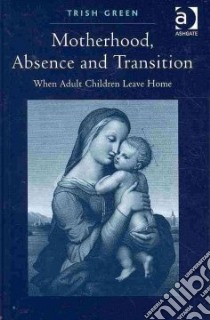Motherhood, Absence and Transition - 9780754677338
Un libro in lingua di Trish Green edito da Ashgate Pub Co, 2010
- € 97.50
- Il prezzo è variabile in funzione del cambio della valuta d’origine
How do mothers manage the experience of separation when their children leave home?
The vast majority of academic texts on motherhood have focussed on women's experiences of the early years of mothering, while texts covering the topic of home-leaving have tended to privilege the young person's experience. Combining lively empirical material with an illuminating social-theoretical framework, Trish Green's book addresses the much neglected area of the mother's experience of separation from her child at the time of their home-leaving.
The book makes clear how the mother's experience of separation is silenced, first by the sociocultural constructions of motherhood per se, second by the privileging of the child's transition to adulthood, and third by a neglect of the relational dimension of this particular life course transition. In doing so the book makes an important contribution to debates on ageing, identity and the life course, providing a timely critique to notions of the centrality of independence to identity in western value systems. It will be of great interest to sociologists with interests in the family and motherhood, gender, identity and the life course, and also to academics in the fields of social work and cultural geography
Trish Green's engaging and well-argued book provides a rich analysis of the complex experiences and reconfigurations in emotions, identities and biographies that mothers face when their adult children leave home. This book will be important reading for those seeking to understand an aspect of mothers' family lives that has been silenced conceptually, culturally and empirically. Rosalind Edwards, London South Bank University, UK
Drawing on a fascinating body of empirical data that describe adult children leaving home, this book considerably expands contemporary western visions of motherhood, demonstrating the scope of its relational qualities throughout the life course. In so doing it questions the values attributed to independence and autonomy, demonstrating their capacity to distort our perceptions of the emotional geographies of family relatedness. Jenny Hockey, University of Sheffield, UK
Informazioni bibliografiche
- Titolo del Libro in lingua: Motherhood, Absence and Transition
- Sottotitolo: When Adult Children Leave Home
- Lingua: English
- Autore: Trish Green
- Editore: Ashgate Pub Co
- Collana: (Hardcover)
- Data di Pubblicazione: 31 Gennaio '10
- Genere: SOCIAL SCIENCE
- Argomenti : Motherhood Psychological aspects Empty nesters Psychology Parent and adult child
- ISBN-10: 0754677338
- EAN-13: 9780754677338


